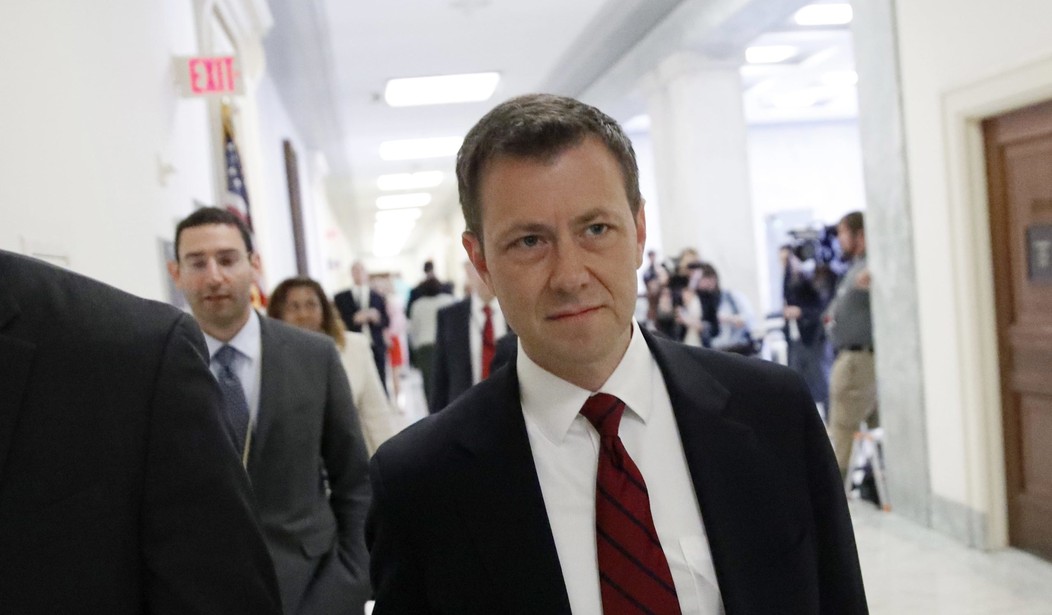Multiple media outlets are reporting that Justice Department Inspector General David Horowitz’s report on abuses by Obama-era officials in obtaining FISA warrants to spy on the Trump campaign will almost certainly disappoint those who believe that political bias colored the FBI’s investigation.
The IG report is due out December 9, but already it appears that there will be no recommendations for indictments of major officials who were in charge of the investigation.
Andrew McCarthy at NRO:
CNN adds that some of the witnesses interviewed expect the IG’s report will “find mistakes in the FBI’s handling of the FISA process, but that those mistakes do not undermine the premise for the FBI’s investigation.” The network describes that premise as the conclusion “that Russia interfered in the 2016 election.”
McCarthy thinks that Horowitz is missing the point if his criticisms stop there.
Of course, that only relates half the story — the uncontroversial half. The FBI’s full premise was that the Trump campaign was complicit in Russia’s election interference.
What is in issue is whether there were adequate grounds for suspicion of a Trump–Russia criminal conspiracy — enough to justify the FBI and the Justice Department in taking the fraught step of investigating the incumbent administration’s political opposition during a presidential campaign, exploiting such powerful counterintelligence measures as FISA warrants, the deployment of informants, and collaboration with foreign intelligence services against Americans who worked on the Trump campaign — the kinds of investigative techniques reserved for hostile foreign powers and terrorist organizations.
Indeed. While a prosecutor might be able to indict a ham sandwich, getting a FISA warrant should be a lot more difficult. It isn’t. Just a handful of the thousands of warrant applications over the years have been denied by a FISA court judge.
During the next eight years, from 2004 to 2012, there were over 15,100 additional warrants granted, and another seven being rejected. Over the entire 33-year period, the FISA court granted 33,942 warrants, with only 12 denials – a rejection rate of 0.03 percent of the total requests.
So Horowitz will be able to hang his case on the notion that the FISA warrants would have been approved anyway, thus negating any efforts to accuse officials of political bias.
That is, if Horowitz wants to whitewash the whole narrative.
If the narrative taking shape is that there may have been some abuses but it doesn’t change the fact that Russia meddled in the election, that misses the point. The questions are: What was the FBI’s evidence — which it represented as verified information in the warrant application — that the Trump campaign was in a cyberespionage conspiracy with the Kremlin? What evidence led the Bureau and the Justice Department to allege that Carter Page — who as late as spring 2016 was apparently cooperating in a federal prosecution of Russian spies — was a willful agent of the Putin regime engaged in clandestine activities against his own country?
Subsequent efforts to cover up the involvement of the virulent anti-Trump FBI counterintelligence chief Peter Strzok may also be swept under the rug.
Although Strzok would later disclaim participation in the Carter Page surveillance application, the texts show he was heavily involved — a fact the FBI and Justice Department attempted to conceal. On October 11, 2016, he told Ms. Page he was “currently fighting with Stu for this FISA” — a reference to Stuart Evans, a lawyer in DOJ’s National Security Division. When the FBI first grudgingly disclosed the Strzok–Page texts, the words “Stu for this FISA” were blacked out.
Subsequent communications, including Ms. Page’s texts to McCabe, indicate that the “holdup” on Justice Department approval of the warrant application related to Evans’s “continuing concerns” about “possible bias of the chs.” The term “chs” is Bureau-speak for “confidential human source” — a reference to Christopher Steele. He, of course, is the former British spy who, along with his Fusion GPS confederates, authored the infamous Steele dossier — a collection of faux intelligence reports, sensational and lurid, that were produced for the Clinton campaign and the DNC. The dossier alleged that Donald Trump was conspiring with the Kremlin to steal the 2016 election, using Carter Page (whom Trump had never actually met) as a key go-between. The FBI and DOJ used the Steele-dossier allegations as part of the probable cause showing for the FISA warrants.
The FBI says the dossier did not play a significant role in acquiring the warrant to spy on Carter Page. But their communications say otherwise.
Horowitz is apparently playing the old Washington game of misdirection. He will solemnly criticize the FBI for errors and carelessness in the warrant application while ignoring the bias and unprofessional attitude of FBI officials from top to bottom that contributed to getting the warrant in the first place.
Is Horowitz concerned about destroying the myth of the FBI’s professionalism? The FBI as an institution is under assault and Horowitz may feel compelled to defend them.
At the expense of the truth? We will see.










Join the conversation as a VIP Member